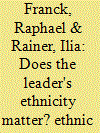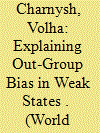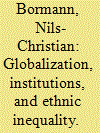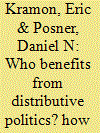| Srl | Item |
| 1 |
ID:
113554


|
|
|
|
|
| Publication |
2012.
|
| Summary/Abstract |
In this article we reassess the role of ethnic favoritism in sub-Saharan Africa. Using data from 18 African countries, we study how the primary education and infant mortality of ethnic groups were affected by changes in the ethnicity of the countries' leaders during the last 50 years. Our results indicate that the effects of ethnic favoritism are large and widespread, thus providing support for ethnicity-based explanations of Africa's underdevelopment. We also conduct a cross-country analysis of ethnic favoritism in Africa. We find that ethnic favoritism is less prevalent in countries with one dominant religion. In addition, our evidence suggests that stronger fiscal capacity may have enabled African leaders to provide more ethnic favors in education but not in infant mortality. Finally, political factors, linguistic differences, and patterns of ethnic segregation are found to be poor predictors of ethnic favoritism.
|
|
|
|
|
|
|
|
|
|
|
|
|
|
|
|
| 2 |
ID:
185604


|
|
|
|
|
| Summary/Abstract |
Two dominant explanations for ethnic bias in distributional outcomes are electoral incentives and out-group prejudice. This article proposes a novel and complementary explanation for the phenomenon: variation in legibility across ethnic groups. The author argues that states will allocate fewer resources to groups from which they cannot gather accurate information or collect taxes. The argument is supported by original data on state aid from the 1891/1892 famine in the Russian Empire. Qualitative and quantitative analyses show that districts with a larger Muslim population experienced higher famine mortality and received less generous public assistance. The Muslims, historically ruled via religious intermediaries, were less legible to state officials and generated lower fiscal revenues. State officials could not count on the repayment of food loans or collect tax arrears from Muslim communes, so they were more likely to withhold aid. State relief did not vary with the presence of other minorities that were more legible and generated more revenue.
|
|
|
|
|
|
|
|
|
|
|
|
|
|
|
|
| 3 |
ID:
179862


|
|
|
|
|
| Summary/Abstract |
Recent research has shown that inequality between ethnic groups is strongly driven by politics, where powerful groups and elites channel the state's resources toward their constituencies. Most of the existing literature assumes that these politically induced inequalities are static and rarely change over time. We challenge this claim and argue that economic globalization and domestic institutions interact in shaping inequality between groups. In weakly institutionalized states, gains from trade primarily accrue to political insiders and their co-ethnics. By contrast, politically excluded groups gain ground where a capable and meritocratic state apparatus governs trade liberalization. Using nighttime luminosity data from 1992 to 2012 and a global sample of ethnic groups, we show that the gap between politically marginalized groups and their included counterparts has narrowed over time while economic globalization progressed at a steady pace. Our quantitative analysis and four qualitative case narratives show, however, that increasing trade openness is associated with economic gains accruing to excluded groups in only institutionally strong states, as predicted by our theoretical argument. In contrast, the economic gap between ethnopolitical insiders and outsiders remains constant or even widens in weakly institutionalized countries.
|
|
|
|
|
|
|
|
|
|
|
|
|
|
|
|
| 4 |
ID:
121600


|
|
|
|
|
| Publication |
2013.
|
| Summary/Abstract |
Papers in the burgeoning empirical literature on distributive politics often focus their analysis on the pattern of distribution of a single patronage good-for example, cash transfers, roads, education spending, electrification, or targeted grants. Yet because governments can favor constituencies through the targeting of multiple public and private goods, drawing general conclusions about distributive politics by investigating just one (or even a few) good(s) can be misleading. We demonstrate the severity of this problem by investigating a particular manifestation of distributive politics-ethnic favoritism-in a particular setting-Africa-and show that the conclusions one draws about who benefits from government allocation decisions can vary markedly depending on the outcome one happens to study. Our findings suggest the need for caution in making general claims about who benefits from distributive politics and raise questions about extant theoretical conclusions that are based on empirical work that focuses on a single distributive outcome. The findings also provide a foundation for a new research agenda aimed at identifying the reasons why political leaders choose to favor their supporters with some public and private goods rather than others.
|
|
|
|
|
|
|
|
|
|
|
|
|
|
|
|